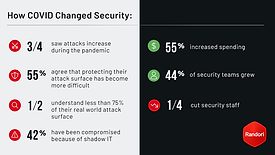Management
29% of cyber threats previously unknown, HP research finds
HP threat intel team reveals rising web browser exploits, RAT-infested delivery alerts, DOSfuscation and other hacker activity
March 17, 2021
Making videoconferences more secure
The surge in their use has also led to a surge in their abuse. But there are steps you can take to better secure your videoconferences.
March 17, 2021
Sign-up to receive top management & result-driven techniques in the industry.
Join over 20,000+ industry leaders who receive our premium content.
SIGN UP TODAY!Copyright ©2024. All Rights Reserved BNP Media.
Design, CMS, Hosting & Web Development :: ePublishing









